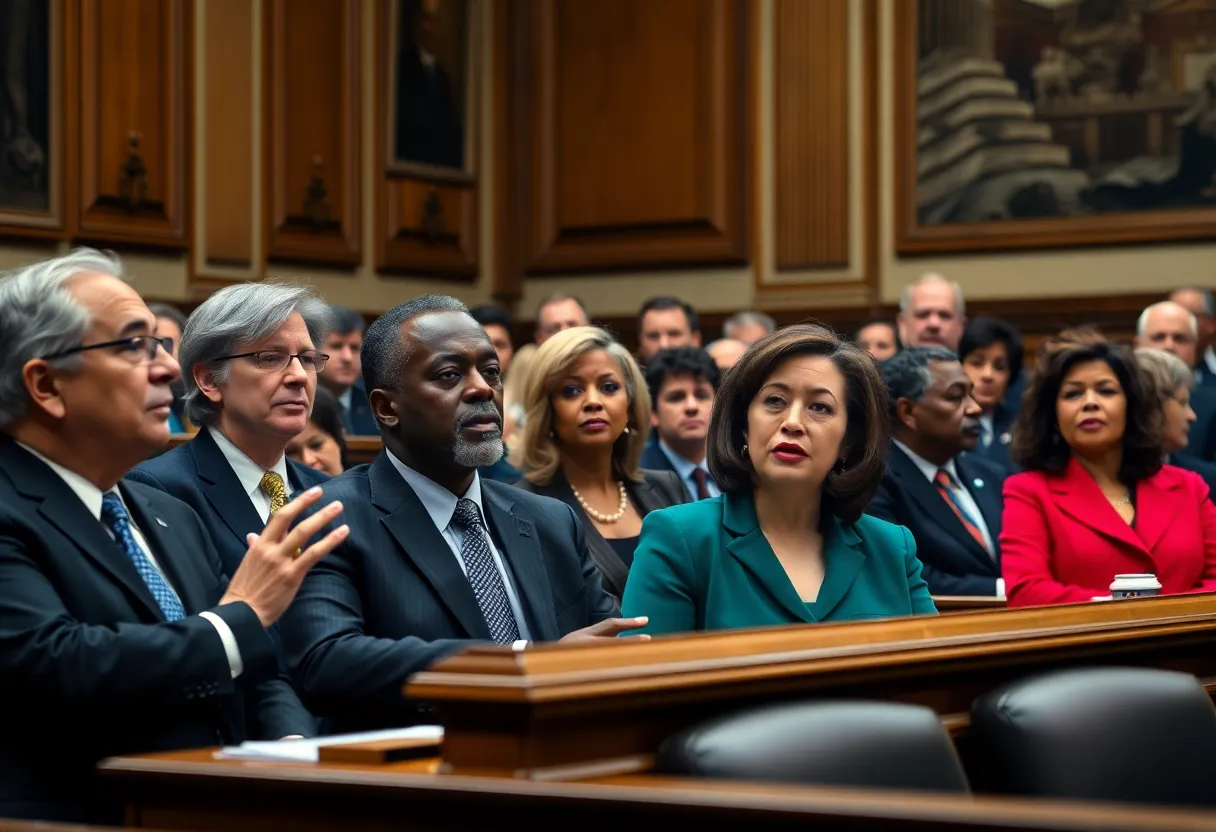News Summary
A coalition of Black lawmakers in Louisiana is seeking judicial backing to uphold a congressional district map that has aided the election of two Democrats. Despite a court ruling denying their request to compel the state attorney general’s support, this map is crucial in representing the state’s significant Black population. The U.S. Supreme Court will soon hear arguments regarding race-based redistricting, as Louisiana lawmakers ponder the implications for equitable representation, particularly in light of shifting political dynamics and ongoing legal challenges.
Baton Rouge, Louisiana – A coalition of Black lawmakers in Louisiana has sought judicial support to defend a congressional district map that has facilitated the election of two Democrats to the U.S. House. A recent court ruling denied these lawmakers’ request to compel Louisiana Attorney General Liz Murrill to advocate for the current map, which has been a focal point in the ongoing debate over race-based redistricting.
In 2022, the Louisiana legislature approved a congressional election map that created two majority-Black districts within six total districts, a configuration intended to mirror the state’s racial demographic, which is approximately one-third Black. This move was designed to enhance Black political representation in Louisiana. However, Attorney General Murrill, who previously defended this map, has shifted her position, now opposing race-based redistricting following heightened pressure from former President Donald Trump to redraw maps for partisan advantage.
The U.S. Supreme Court is scheduled to hear arguments relating to race-based redistricting on October 15. Murrill maintains that her stance allows for discretion regarding the administration of the law and argues that the lawmakers lack the standing to force her into a “ministerial” role regarding the map’s defense. This disagreement puts into question the balance of power between the attorneys general and the legislature’s ability to uphold laws they enact, particularly for the state’s Black Caucus.
Historically, the current congressional map has been a result of compromise, designed to safeguard the political interests of key Republican lawmakers while also addressing the needs for Black representation in the state. As the legal arguments unfold, they will evaluate whether the creation of minority districts contravenes the Fourteenth and Fifteenth Amendments of the U.S. Constitution. The Supreme Court has previously upheld provisions that permit challenges to discriminatory district designs under the Voting Rights Act, yet it has also recently restricted the enforcement of this act.
Judicial reviews have indicated that Louisiana’s latest congressional map is likely to contravene the Voting Rights Act, prompting the necessity for reevaluation based on accurate racial demographics in future elections. A federal appeals court has confirmed that the state must amend its maps to better reflect the Black population, ensuring equal electoral representation.
The complexity of Louisiana’s redistricting landscape arises from varying interpretations of how to prioritize race versus political considerations in the district formation process. The state has faced increased scrutiny following unsuccessful attempts to redraw congressional maps that adhere to both legal requirements and party interests.
Extensive court proceedings have been prolonged, especially with the upcoming Supreme Court hearings likely to influence legislative actions. State lawmakers are preparing for potential special sessions in light of the impending Supreme Court ruling. Concurrently, other states are engaging in “mid-cycle” redistricting practices in response to political pressures and shifts in population dynamics, fueling concerns regarding fair representation across the country.
The situation in Louisiana exemplifies the tensions and complexities involved in redistricting, particularly as it relates to racial demographics and political maneuvering. As the Supreme Court takes on the significant task of addressing these issues, the outcomes could have far-reaching implications, not only for the state of Louisiana but for nationwide policies regarding race and representation in congressional districts.
Deeper Dive: News & Info About This Topic
- Democracy Docket: Federal Court Delivers Major Win for Black Voters in Louisiana
- LA Illuminator: Louisiana Redistricting Updates
- NOLA.com: Louisiana Special Session on Redistricting
- AP News: Supreme Court and Louisiana Redistricting
- Wikipedia: Redistricting in the United States

Author: STAFF HERE NEWORLEANS WRITER
The NEW ORLEANS STAFF WRITER represents the experienced team at HERENewOrleans.com, your go-to source for actionable local news and information in New Orleans, Orleans Parish, and beyond. Specializing in "news you can use," we cover essential topics like product reviews for personal and business needs, local business directories, politics, real estate trends, neighborhood insights, and state news affecting the area—with deep expertise drawn from years of dedicated reporting and strong community input, including local press releases and business updates. We deliver top reporting on high-value events such as French Quarter Festival, New Orleans Jazz & Heritage Festival, and Essence Music Festival. Our coverage extends to key organizations like the New Orleans Chamber of Commerce and Greater New Orleans, Inc., plus leading businesses in energy, healthcare, and education that power the local economy such as Entergy, Ochsner Health, and Tulane University. As part of the broader HERE network, including HEREShreveport.com, we provide comprehensive, credible insights into Louisiana's dynamic landscape.

